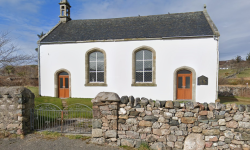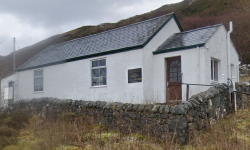CHAPTER 3 — COMMUNION AT INVERNESS.
What time she took to accomplish her weary task is not now known; but the Lord whom she sought after had His blessed eye upon her, ignorant as she still was of Him. Her way, after crossing Kyle-Rhea, lay through Glenelg; and after crossing the
heights, she made her way through Glenmoriston. She then found herself at Loch Ness, by the side of which she walked till she arrived at Inverness. She had now reached the only bridge then spanning the river Ness. It was an oaken bridge, a frail erection, which was carried off some years ago by a flood. The time was that of the administration of the sacrament of the Lord’s Supper in that town. She spoke in her usual strain to those she met, but encountered many strange rebuffs on putting her questions.
At last she was led to address one who at once felt a deep interest in the barefooted, bareheaded girl, who had accosted her just as she had many others before. Mary Bethune observed a person, having the appearance and bearing of a lady, walking along the bridge on her way to the place of worship which she usually attended. To her she made up.
Repeated disappointments having intensified her earnestness, she called out—“O lady! Is God in this town? And if so, where shall I find Him?” The lady looked at first with amazement, as many others had done on similar occasions—just because an all-important question of this kind is so seldom put.
She hesitated a while before replying; and then, on Mary reiterating the question with still greater earnestness, she replied— “Yes, God is in this town. Come you with me, and perhaps you may find Him.” She then took the girl by the hand, walked with her to the church, and led her in to the seat which she herself occupied.
The services of the day having been begun, Mary Bethune was all attention; and we may suppose her kind friend to have been deeply exercised in prayer for the salvation of the poor friendless child thus providentially thrown on her for protection.
The minister engaged in the work that day is said to have been Rev James Calder of Croy, a true man of God, as was his father before him, and as his three sons were after him. He seemed that day to find the declaration of the whole truth an easy matter; and he had one hearer, at least, who drank in every word he uttered concerning God, concerning the sinner, and concerning the Saviour. And as he became more and more earnest, and more than ordinarily simple and clear while enlarging on the subject at hand, Mary Bethune was enabled clearly to apprehend the truth proclaimed. She could contain herself no longer: she started up and, clapping her hands, exclaimed—“I see Him now; I understand it all now; I have found Him now! I have found Him! I have found Him!”
Many may regard all this as rhapsody. There have been too many instances in which persons who loudly proclaimed their deliverance from ignorance, doubt, and unbelief, have given occasion for scoffers to deride all such experiences as delusion. In Mary Bethune’s case, however, that moment in the old Gaelic church at Inverness, proved to be the moment of her spiritual birth. She could now forget all her weary wanderings from the western shores of the isle of Skye. She now knew One on whom she could lean with assured confidence for time and for eternity. She realised pardon for the past, and the foundation for a good hope for the future. She might not at that time be able to give such clear answers to questions which might be put to her as she could at a later stage; but she had in her soul a knowledge of the same nature and kind as Anna had when she recognised the promised Messiah in old Simeon’s arms in the court of the Temple at Jerusalem.
The first outburst of enraptured feeling over, she sat with all composure during the rest of the discourse, and joined in the service with the congregation. Mary could now say, “This God is my own God, the God of my salvation;” and she might fully rest on His providence for all that concerned her welfare in life. Even should all the people in church pass out without taking any interest in her, she knew that He who kept her and shielded her all the way, and who had that day revealed Himself to her soul, would raise up some friend to act towards her the part of a guardian. She had that, indeed, already; for the kind lady who led her into church could not now part with her. She conducted her out as she conducted her in; she brought her to her own house, provided for her wants, and watched over her with a mother’s solicitude.

